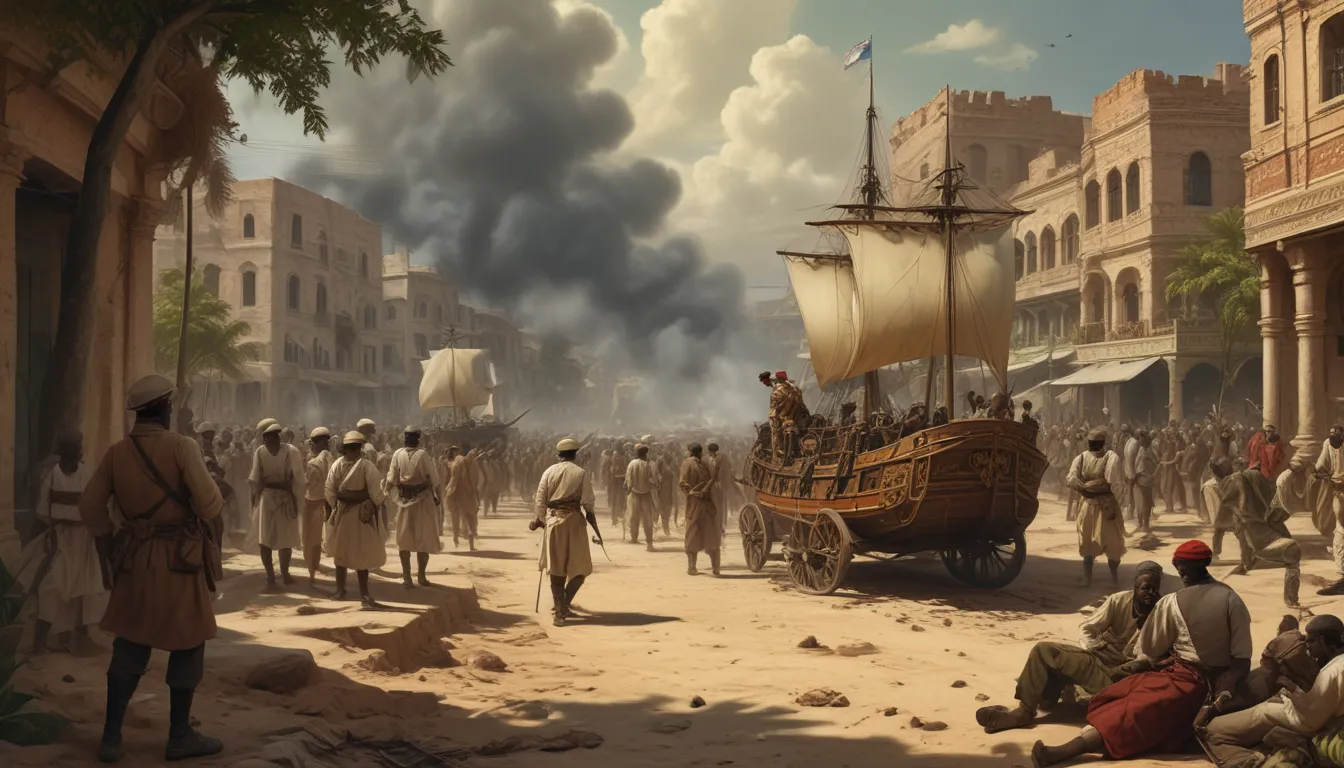The images in our articles may not match the content exactly. They are used to grab your attention, not to show the exact details in the text. The images complement the text but do not replace it.
The intriguing and historically significant Anglo-Zanzibar War, lasting between 38 to 45 minutes on August 27, 1896, has captured the fascination of many due to its brevity and profound implications. This conflict between the United Kingdom and the Zanzibar Sultanate sheds light on the complexities of colonialism, military technology, and power dynamics in East Africa. In this comprehensive article, we will delve into 20 compelling facts about the Anglo-Zanzibar War, exploring its origins, the swift battle, casualties, consequences, and lasting legacy. Join us on a journey through history as we unravel the enigma of the shortest war ever recorded.
Understanding the Catalyst: What Sparked the Anglo-Zanzibar War?
The triggering event for the Anglo-Zanzibar War was the sudden death of Sultan Hamad bin Thuwaini, a pro-British ruler. Upon his demise, his nephew Sultan Khalid bin Barghash took the throne without British approval, violating an existing treaty. The British, seeking to influence the succession, demanded Khalid’s abdication in favor of a more compliant ruler, Sultan Hamid bin Mohammed. Khalid’s refusal to step down escalated tensions and led to the declaration of war.
- Sultan Hamad’s death created a succession crisis.
- Sultan Khalid ascended the throne without British consent.
- British demanded Khalid’s abdication in favor of a ruler they could control.
The Record-Breaking Shortness of the Conflict
The Anglo-Zanzibar War holds the distinction of being the shortest war in recorded history, lasting a mere 38 to 45 minutes. British forces, armed with advanced military technology and naval power, swiftly bombarded the Sultan’s palace, overpowering the defending forces. Sultan Khalid’s quick retreat from the palace marked the abrupt end of the conflict, showcasing the overwhelming superiority of the British forces.
- The war’s duration ranged between 38 to 45 minutes, setting a record.
- British forces demonstrated superior military capabilities during the bombardment.
- Sultan Khalid’s swift retreat signified the quick resolution of the conflict.
Casualties and Far-Reaching Consequences
Despite its brevity, the Anglo-Zanzibar War resulted in significant casualties and far-reaching consequences. Approximately 500 defenders of the Sultan were killed or wounded, while British losses were minimal. Following the war, Sultan Khalid sought refuge in the German consulate before being captured and exiled by the British. The installation of Sultan Hamoud bin Mohammed as the new ruler marked the beginning of the abolition of slavery in Zanzibar, addressing a longstanding issue in the region.
- Around 500 defenders suffered casualties during the conflict.
- Sultan Khalid sought asylum in the German consulate and was later captured by the British.
- Slavery was abolished under the new Sultan’s rule, addressing a critical issue in Zanzibar.
Colonialism’s Significance and Impact
The Anglo-Zanzibar War served as a poignant reminder of British influence in East Africa and represented a pivotal moment in the history of colonialism in the region. It underscored the willingness of the British Empire to employ military force to secure its interests and highlighted the power dynamics between European colonial powers and their territories. Furthermore, the war laid the groundwork for a more structured colonial administration in Zanzibar and the broader East African region.
- The conflict emphasized British dominance in East Africa.
- Marked a crucial moment in the history of colonialism.
- Set the stage for structured colonial governance in the region.
Enduring Legacy and Commemoration
Despite its brevity, the Anglo-Zanzibar War left a lasting legacy on Zanzibar’s history and continues to be a significant event in the study of colonialism and military history. The war’s unprecedented shortness and the lengths to which imperial powers would go to secure their interests are commemorated through various memorials in Zanzibar. It stands as a testament to the intersection of power, conflict, and the enduring impact of historical events on nations and their people.
- The war’s legacy remains embedded in Zanzibar’s historical narrative.
- Memorials in Zanzibar commemorate the significance of the conflict.
- An important event in both colonial and military history.
Impact on International Relations and Technological Advancements
The aftermath of the Anglo-Zanzibar War reverberated in international relations, particularly between Britain and Germany. The swift resolution of the conflict and the installation of a pro-British ruler in Zanzibar showcased British dominance in the region. This development necessitated diplomatic negotiations to maintain a balance of power in East Africa, subtly shaping the dynamics of colonial competition on the continent. Additionally, the war highlighted the role of technological advancements in military engagements, demonstrating how superior weaponry can lead to decisive victories.
- Influenced relations between Britain and Germany in East Africa.
- Technological advancements played a pivotal role in the conflict’s outcome.
- Necessitated diplomatic efforts to uphold regional stability.
Unveiling History’s Ephemeral Encounter
The Anglo-Zanzibar War, lasting a mere 38 minutes, offers a glimpse into a brief yet impactful moment in history. This conflict serves as a stark example of British imperial might, altering the course of Zanzibar’s trajectory and emphasizing the complexities of sovereignty and resistance in the context of colonialism. By reflecting on this fleeting encounter, we gain insights into the broader implications of colonial power struggles, the triggers of conflict, and the enduring repercussions on nations and their populations. Remembering pivotal events like the Anglo-Zanzibar War enhances our understanding of global relations and the intricate tapestry of historical narratives that shape our world.
Conclusion: Engaging with Trustworthy Content
Our commitment to delivering engaging and accurate content is paramount in our quest to provide valuable insights and information to our readers. Each fact presented on our platform is contributed by individuals like you, ensuring a diverse range of perspectives and knowledge. Our dedicated team of editors rigorously reviews each submission to uphold the highest standards of credibility and authenticity. Trust in our dedication to quality and authenticity as you explore, learn, and engage with historical narratives and fascinating historical events like the Anglo-Zanzibar War.
In conclusion, the Anglo-Zanzibar War stands out not only for its brevity but also for its lasting impact on Zanzibar and the broader context of colonial power dynamics in East Africa. As we reflect on this historic conflict, we unravel a tapestry of resilience, dominance, and the intricate dance of nations vying for control. Through commemorating events like the Anglo-Zanzibar War, we honor the legacies of nations and peoples, preserving the lessons of the past for generations to come.






